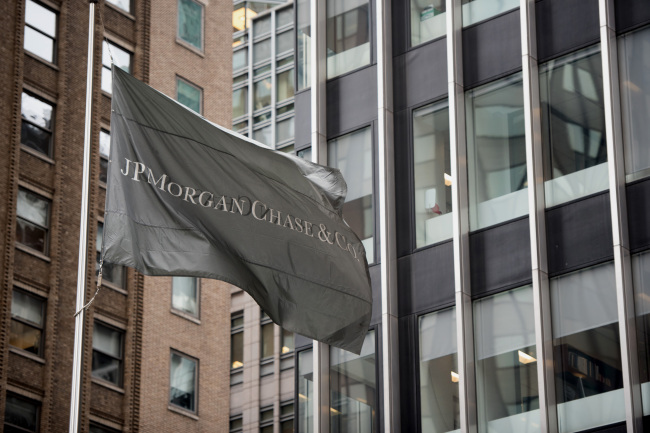 |
A JPMorgan flag flies at the company’s headquarters in New York. (Bloomberg) |
JPMorgan Chase & Co.’s foreign-exchange traders reaped a gain of as much as $300 million after the Swiss central bank roiled markets by abolishing its cap on the franc, according to two people with knowledge of the matter.
The bank netted $250 million to $300 million on the day of the Swiss National Bank’s surprise decision to scrap the franc ceiling of 1.20 against the euro, said the people, who asked not to be identified because they weren’t authorized to speak publicly. A JPMorgan spokesman declined to comment.
The SNB’s surprise decision on Jan. 15 to remove the three-year-old cap sent the franc soaring as much as 41 percent against the euro that day. JPMorgan is one of the few to emerge from the turmoil with a profit. Citigroup Inc., Deutsche Bank AG and Barclays Plc suffered about $400 million in cumulative trading losses, people with knowledge of the matter have said.
Morgan Stanley, owner of the world’s largest brokerage, and Goldman Sachs Group Inc. have said the impact of the move was immaterial. Bank of America Corp. Chief Executive Officer Brian T. Moynihan told CNBC on Jan. 20 that while the bank had made money, the move hadn’t had a big impact on the firm.
JPMorgan told clients it would complete all orders at 1.02 francs per euro as the Swiss currency appreciated from 1.20 francs per euro to almost 0.85 on Jan. 15, the people said. The decision allowed traders at the New York-based bank to assess their position immediately and buy or sell the franc accordingly, the people said.
JPMorgan, the world’s biggest investment bank, generated $2.5 billion in fixed-income trading revenue in the final three months of 2014. That was a 23 percent drop from a year earlier, driven by the sale of a commodities unit and lower volume in credit and securitized products.
The division had an average value-at-risk of $33 million in the quarter, compared with $39 million a year earlier. The gauge attempts to give an estimate of how much the bank could lose in the markets on a single day. (Bloomberg)








![[Today’s K-pop] Blackpink’s Jennie, Lisa invited to Coachella as solo acts](http://res.heraldm.com/phpwas/restmb_idxmake.php?idx=644&simg=/content/image/2024/11/21/20241121050099_0.jpg)